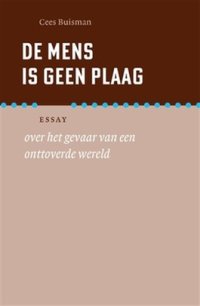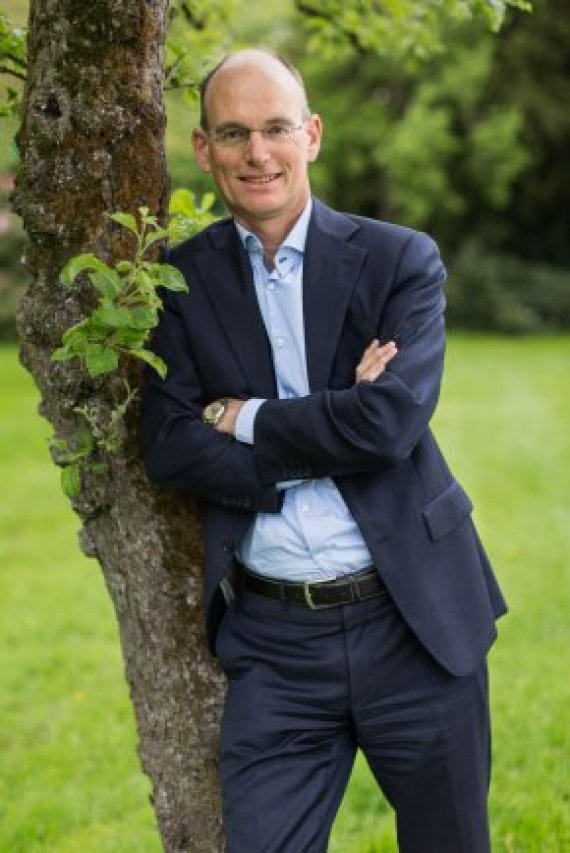Cees Buisman
‘Terrifying,’ was his verdict on publishing a book. But ‘so far so good’. The book was on its second printing after two weeks. ‘I’m getting very positive responses and the first reviews are reasonably positive too.’ In the essay, subtitled ‘on the dangers of a demystified world’, Buisman, professor of Biological Recycling Technology and director of the successful water institute Wetsus, deplores the technocratic approach to our environmental problems. As an alternative, he maps out a new route that is based on greater awareness and less egocentricity.
In your book you strongly oppose common rational perspectives on humanity, such as the beliefs that life emerged by chance and that there is no such thing as free will. You say such ideas take the mystery out of life and make it seem purposeless. What is the problem?
‘The point is for me that there is something that goes beyond our knowledge. If we could ultimately figure out and explain everything, and if we saw humanity as no more than some sparks of electricity and a load of atoms, where would we get the inspiration from to do anything for anyone else? I can’t imagine many people find that a very uplifting or inspiring starting point for a quest to become a better person, and to become more aware.’
What do you mean by awareness?
‘Awareness is one of the three great transcendent things: the emergence of matter, the emergence of life, and the emergence of awareness. Awareness means gaining self-knowledge. Since its beginnings, human awareness has grown continuously. To me, that is the most optimistic thing about this book: humanity is growing in awareness. And as awareness grows, we become less self-centred.’
With better cooperation the earth can accommodate 10 billion people
With more awareness you believe the earth can easily accommodate 10 billion people. Because the more aware we are, the less self-centred we are, the more we share and the faster the environmental crisis is solved. Is it as simple as that?
‘Don’t you think so, then? It seems logical to me. Currently one billion people use 80 percent of all the natural resources on earth. And the other six billion used the remaining 20 percent. If those one billion people used the same amount as the other six, there would be no problem at all. There would easily be room for another three billion people. Mainly because it’s not just us who need to become more aware, but the whole world. That means we have to cooperate better everywhere. In Africa, for instance. If there was better cooperation there, there would be much less hunger.’
You say the current scientific and technological approach is not going to save the world. You propose a new, natural technology. What is that?
‘That is technology that tries to be more careful with human health and nature. We do a lot of things that are bad for the environment. One of the reasons for this is that we do not understand the whole complex ecological web. We extract a little piece of the whole, out of context, and do research on it. And then we think that we have gained an understanding of the whole. We do this all the time, whether you are talking about the effects of a medicine, pesticides or manure injection. And time and again we come to the conclusion years later that we had got the wrong end of the stick and have done a lot of damage. I call that simplistic, technocratic and unreflecting technology. The opposite of that would be natural, complex and aware technology.’
Are you involved in natural technology yourself?
‘I’ve been working on environmental technology for about 35 years and I’m moving steadily in that direction. Look at wastewater purification, a beautiful example. That is a natural process that normally takes place in the river. Using the same natural bacteria we try to optimize the process in the purification of water from the sewers. Now, for example, we are looking at how best to extract organic matter from the sewers that should go back into the soil. What kind of treatment is right for that purpose, should you ferment it or compost it, and which process has the greatest added value for the soil? That is highly complex.’
In the book you take up the cudgels for a ban on artificial fertilizer. Why?
‘We are living in a country where 35 million kilos of phosphate is burned or used in road-building every year, while at the same time we are still using phosphate fertilizer. That’s incredible, isn’t it? The Netherlands destroys vast amounts of phosphate. Phosphate sludge from the sewers – human manure – is used as fertilizer all over Europe, except here. Here that is illegal, ostensibly because there are too many heavy metals in it. But there are far more heavy metals in cow and pig manure. The real reason is that we have too much manure. The manure of humans, cows, pigs and chickens between them contains four times as many nutrients as are required by Dutch agriculture. So we burn the sewage sludge and chicken manure, and export the cow and pig manure. And we still use artificial fertilizer ourselves. That is just bizarre.’
How do we arrive at a higher level of awareness?
‘I don’t know either. I am not a psychologist or a spiritual teacher. But I do know that if we are only interested in growing in wealth and not in awareness, the environmental problem will only get bigger. I believe awareness can grow. And in order to become more aware you need some introspection. We live in a world in which external stimuli have been multiplied to the maximum through smartphones and social media. We need to turn our gaze within more.’
De mens is geen plaag, over het gevaar van een onttoverde wereld, Cees Buisman, publisher Bornmeer, 144 pages, 15 euro


